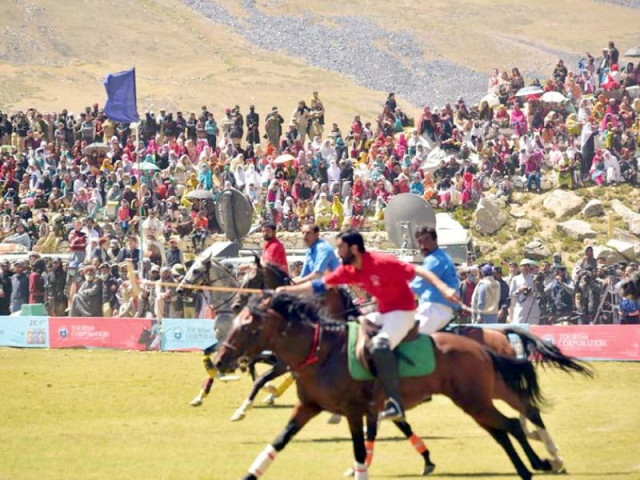Rumble on the roof of the world
Shandur polo festival brings arch-rivals Gilgit and Chitral face-to-face today

Players take part in a polo match at Shandur. PHOTO: EXPRESS
They race down the lush green fields, chasing and fiercely striking the ball with their long sticks.
While the sport has changed its shape in other parts of the world, but here, in Shandur, it still thrives in its traditional splendour.
“There are no rules, no foul and no referee in our polo matches. We believe that everything is allowed in war and polo,” said Inayatullah Faizi, a local historian from Chitral told The Express Tribune with a glint of pride in his eyes.
This thrilling polo combat between traditional arch rivals Gilgit and Chitral is all set to begin on Saturday (today) on the world’s highest polo ground, located at 12,500 feet above the sea level in Shandur on the border of Gilgit-Chitral.
Jointly organised by Khyber-Pakhtunkhwa (K-P) and Gilgit-Baltistan (G-B) governments, since the game is their shared cultural heritage, the festival will continue for three days.
“Here polo is spontaneous,” Faizi said. “Northern areas of the country have maintained the tradition of polo games as pure as it was a thousand years ago,” he added, noting that polo can be traced back to 3,000 years.
‘On the roof of the world’
This undulating polo ground is located on a plateau known as the ‘rooftop of the world’.
It’s natural grassy pitch is often referred to as little Tibet.
The venue was first selected for polo games by a British Political Officer, who got whimsical about the idea of playing polo in the moonlight on a site so close to the moon.
Ever since the tradition of hosting a tournament on the grassy plains of Shandur has continued.
It comes alive for three days at the peak of summer when a tent village is pitched with local and even international tourists finding their way to the site over rough jeep tracks among the mountains.
For the remaining 11 months of the year, the ground remains either frozen or deserted.
Royal game
Polo has an imperial air it because the royalty patronised it over the centuries.
A martial equestrian sport, Faizi explained that the great Mongol ruler Genghis Khan had trained his mounted armies through the sports.
Sultan Qutubuddin Aibak of India was also an enthusiast and had died while playing the sport.
Later, Mughal Emperor Jalaluddin Akbar too played polo and also mentioned the sport in the Akbarnama, the official record of his rule.
However, in G-B, there is no exact record available of when the sport started being played in the mountainous region. Locals, though, believe Ali Sher Khan Anchan (1595—1633), a Balti hero who had carved out a vast empire extending from Chitral to Tibet, promoted this game.
In the 1800s, the game began to be played in Europe after soldiers who had served in India brought the game back home with them.
But it was not until the 1980s when the sport gained prominence in G-B when a growing number of visitors thronging the tournament to watch the matches at Shandur.
Fiery steeds
A polo pony is supposed to measure 15 hands or 155cm by global standards. However, Chitrali players do not prefer big horses, since they are considered to be too rigid for the game and cannot turn quickly.
In Chitral and Gilgit, horses are specially bred for polo. People get horses from stud farms in Sargodha and Sahiwal, raise and train them. The G-B and K-P governments also provide financial support for the maintenance of these horses.
Political dispute
G-B and K-P have been embroiled in a political dispute over the ownership of the Shandur Pass for decades which has also affected this traditional game.
In 2010, G-B boycotted the game. In 2012, the G-B government told its polo teams to return as the region recorded its protest, while in 2013 the tournament was cancelled.
However, in 2016 both the governments agreed not to disrupt the centuries-old tradition over political controversies.
This year, teams of Chitral, G-B, Laspur, Mastuj and Ghizer are participating in the competition.
“The K-P government has taken all steps to hold the festival in a befitting manner to attract domestic and foreign tourists in large number this year,” said K-P Tourism and Culture Secretary Muhammad Tariq Khan. He added that for the promotion of culture and tourism in the area, the festival will play very important role.
Published in The Express Tribune, July 29th, 2017.



















COMMENTS
Comments are moderated and generally will be posted if they are on-topic and not abusive.
For more information, please see our Comments FAQ